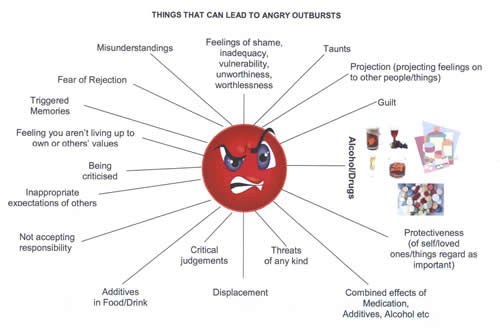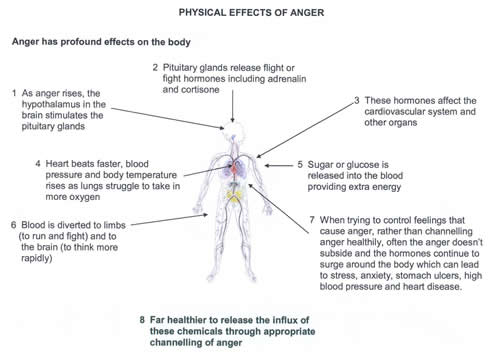Positive Health Online
Your Country

Holistic Wellbeing: Approaches To Coping With Anger
listed in holistic psychotherapy, originally published in issue 159 - June 2009
The havoc wreaked by uncontrolled anger, the lives it damages, is incalculable, since much of it takes place behind closed doors, is kept hidden and is too often excused or explained away.
Only when anger gets seriously out of control, when it damages relationships, jeopardizes career, or leads to criminal charges, does help tend to be sought. Yet it is interesting that many people who seek counselling and other therapies in attempts to 'control anger' just want a quick fix, simply want to be told what to do to manage their anger. They fail to realize how essential it is, first, to understand their anger, to recognize what triggers it, and then to find healthy ways to channel this strong emotion.
Anger is a well-developed coping mechanism for when we feel threatened, or when our goals are thwarted. It enables us to react decisively in situations where there's little time for reasoned analysis, and it can motivate problem solving, achievement of goals and removal of threats. It is "an emotional state that varies in intensity from mild irrational to intense fury and rage".[1]
Our earliest memories of anger or violence have a lasting impact and influence how anger becomes a dominant feature in adult life. Anger issues can frequently be traced back to learned behaviour from parents and significant others.
Increased anger is also a product of frenetic 21st century living, where feelings of insecurity and worry on many levels influence behaviour – fear of failure, worries over redundancy / salary cuts, debt issues, loss and poverty in the fallout from the banking debacle, and when company and individual bankruptcies reach an all time high.[2] The stress of coping with aggressive competitive work practices, targets and tight deadlines; traffic jams and road rage . . . all take their toll, not least in high levels of stress, anxiety and depression which can fuel anger outbursts.
Emotional outbursts frequently lead to embarrassment and regret[3] at the milder end of the spectrum, and can result in damaged property and lives at the other end. However, many people with anger problems have difficulty admitting it. So often I hear "I just can't help it, it's the way I am / we are in my family"; "I feel the rage building up but can't do anything about it" or "It's his / her / their fault. They shouldn't wind me up."
Therapy and/or anger management training which encourages an holistic approach to aid understanding of sources of anger and personal triggers for this strong emotion, and provides assistance in developing healthy coping strategies, has the highest success rate in reducing the harmful effects of the varying degrees of anger, from frustration through to full blown rage.
In both my private Counselling practice and as part of the free Counselling service I provide to YMCA residents, as well as during the Anger Management training programmes I run, my aim is to promote healthy change through personal empowerment. I therefore encourage honesty in exploring:
- Anger dynamics within the home currently and during one's upbringing;
- Personal patterns of anger and their impact;
- Levels of frustration and anger within environments of regular interaction with others;
- Healthy, holistic approaches to channelling, reducing and managing anger.
Being a slave to temper is light years away from personal empowerment. However, anger can be managed holistically in ways that enable automatic triggers to be disarmed, habitual negative responses to be altered and patterns of behaviour to change. The effects on overall wellbeing can be considerable.
Anger is different for everyone. What infuriates one person may not bother another in the slightest.


Triggers for Anger
I often see evidence of suppressed anger – anger turned inward with no healthy outlet – manifesting as 'depression'. I see it also in the various forms of physiological, emotional and psychological states of being which cause differing degrees of confusion and distress for the individual and their loved ones, and which damage relationships.
Depression is high on the agenda for utilization of NHS IAPT (Improving Access to Psychological Therapies) funding – mainly via Cognitive Behavioural Therapy. However, Dr Andrew McCulloch, Chief Executive of the Mental Health Foundation says: "In a society where people can get help for depression and anxiety, panic, phobia, eating disorders and a range of other psychological and emotional problems, it seems extraordinary that we are left to fend for ourselves when it comes to an emotion as powerful as anger. We need to be able to recognize when anger is damaging our lives, ask for help and receive it."[4]
As the AAP[5] highlights, unexpressed anger can lead to pathological expressions such as passive-aggressive behaviour (getting back at people indirectly without telling them why, rather than dealing with them directly in an assertive manner). A history of suppression rather than constructive expression of frustration and anger can lead to personality traits such as cynicism, hostility and hyper-critical tendencies such as constantly putting others down.
Healthy Ways of Dealing with Anger
Anger is usually a healthy part of our emotional repertoire that helps us instinctively detect and respond to threatening situations and can be a powerful motivating force. Used positively, it can drive change and get things done. It can spur us on to achieve – if only to prove someone wrong – and can be a useful channel for distress, a sense of injustice and/or emotional pain.
Common approaches to dealing holistically with anger include both conscious and unconscious processes:
- Exploring earliest memories of anger / violence and how these have become dominant in adulthood;
- Identifying what contributes towards and triggers anger outbursts for you;
- Recording anger incidents in a log to pinpoint any common themes;
- Learning about the psychological games played at times (which often trigger anger) and how to deal with them;
- Appreciating that you're more likely to respond angrily when tired, hungry, lonely, disappointed or stressed;
- Eating as healthily as possible to help improve mood. Certain foods, including bananas, contain the amino acid tryptophan[6] which increases serotonin (a neuro transmitter in the brain). This is said to maintain a happy feeling, keep moods under control and relieve depression;
- Avoiding 'junk food' and artificial additives;
- Agreeing to differ instead of insisting on being right;
- Walking away, in ways that don't fuel conflict;
- Channelling anger through vigorous exercise and sport. Releases excess adrenaline/cortisol and triggers endorphins (known also as the 'happiness hormone');
- Improving skills in communication and assertiveness;
- Practising ways to calm yourself. Meditation (mindful awareness) alters brain wave pattern, slows the heart and pulse rate and brings greater clarity and insight;
- Using humour. Laugh at yourself. See the funny side and help others to do so too;
- Learning to forgive – them and yourself.
Anger is a powerful energy force. Used constructively, it can spur creativity, achievement, and drive changes for the better. Used irresponsibly, it can jeopardise your relationships, your work, your health and hopes for happiness.
Getting help in understanding yourself, your anger and what triggers it; learning holistic preventative and anger reduction/anger management techniques – and then using this awareness to replace negative angry behaviour with more positive thoughts and actions, can result in long lasting benefits.
If anger is a real problem for you or someone you know, the first step is to admit it and then to seek help.
Resources
- Anger Management training and Person-centred counselling integrating Cognitive Behavioural Therapy with Kay Zega – 01905 26002; http://www.counselling-directory.org.uk:80/counsellor_21374.html
- Controlling Anger – a Self-Help Guide. NHS Library for Health. Clinical Knowledge Summaries. http://cks.library.nhs.uk
- Anger & Wisdom – Keep Your Cool Kit. British Association of Anger Management www.angermanage.co.uk
- How to deal with anger. MIND (National Association for Mental Health) www.mind.org.uk
- Stress. The Mental Health Foundation. www.mentalhealth.org.uk
- Cognitive Behavioural Therapy. The Royal College of Psychiatrists. www.rcpsych.ac.uk
References
- Spielberger C. APA www.apa.org
- BBC News. Bankruptcies Reach Record Levels, http://news.bbc.co.uk/1/hi/business/8028386.stm 1 May 2009.
- Minard J. Tempering Temper. Positive Health Magazine Issue 89 June 2003,
- McCulloch A. Problem Anger is Endemic and Ignored, The Mental Health Foundation. www.mentalhealth.org.uk March 2008.
- APA, Controlling Anger Before it Controls You. www.apa.org
- Silver-Leigh, V, New Perspectives, Positive Health Magazine Issue 112, June 2005.
Comments:
-
No Article Comments available